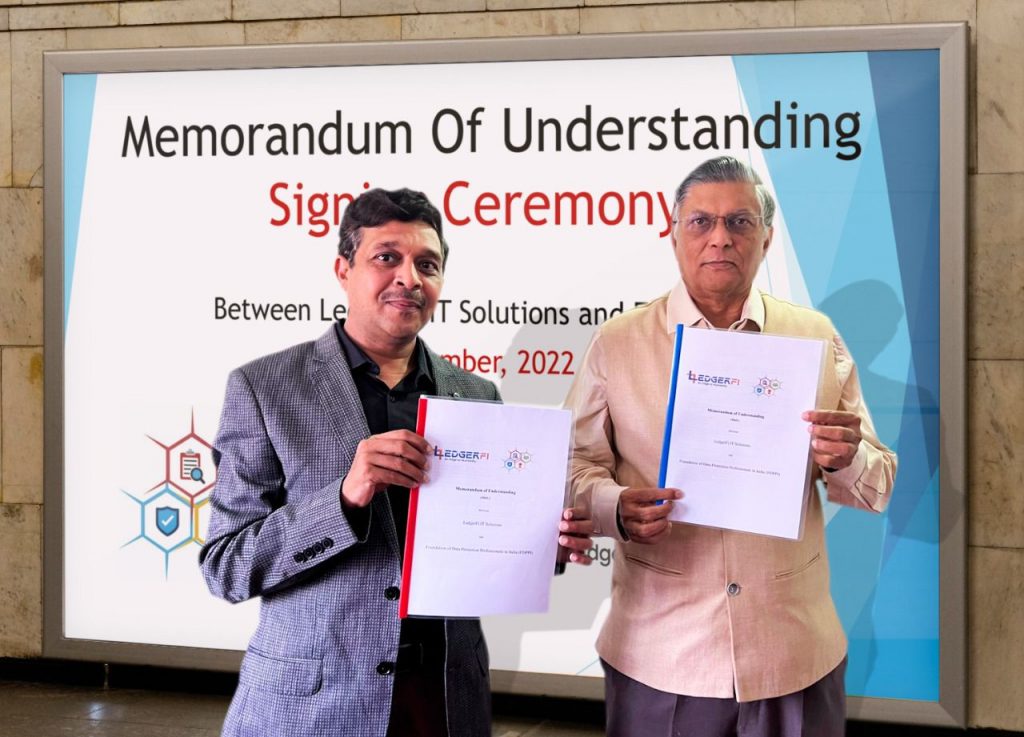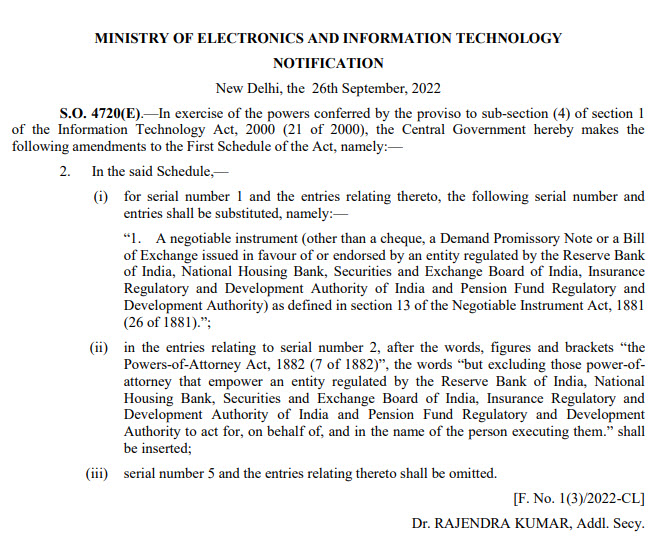The Intermediary guidelines and Digital media ethics rules of 25th February 2021 had attracted a lot of criticism from the industry and has even been questioned in a Court.
A case is also going on in Karnataka High Court where Twitter is trying to fight some of these intermediary guidelines (refer here)
Now the Government has come up with an amendment of the rules of 25/02/2021 through an amendment notification dated 28th October 2022.
The essential part of the amendment is captured below.
- Constitution of the Grievance Appellate Committee
The new notification states as under:
In the Information Technology (Intermediary Guidelines and Digital Media Ethics Code) Rules, 2021 (hereafter referred to as the said rules), in rule 2, in sub-rule (1), after clause (k), the following clause shall be inserted, namely:—
(ka) Grievance Appellate Committee‟ means a grievance appellate committee constituted under rule 3A;.
4. After rule 3 of the said rules, the following rule shall be inserted, namely:—
3A. Appeal to Grievance Appellate Committee(s).—(1) The Central Government shall, by notification, establish one or more Grievance Appellate Committees within three months from the date of commencement of the Information Technology (Intermediary Guidelines and Digital Media Ethics Code) Amendment Rules, 2022.
(2) Each Grievance Appellate Committee shall consist of a chairperson and two whole time members appointed by the Central Government, of which one shall be a member ex-officio and two shall be independent members.
(3) Any person aggrieved by a decision of the Grievance Officer may prefer an appeal to the Grievance Appellate Committee within a period of thirty days from the date of receipt of communication from the Grievance Officer.
(4) The Grievance Appellate Committee shall deal with such appeal expeditiously and shall make an endeavour to resolve the appeal finally within thirty calendar days from the date of receipt of the appeal.
(5) While dealing with the appeal if the Grievance Appellate Committee feels necessary, it may seek assistance from any person having requisite qualification, experience and expertise in the subject matter.
(6) The Grievance Appellate Committee shall adopt an online dispute resolution mechanism wherein the entire appeal process, from filing of appeal to the decision thereof, shall be conducted through digital mode.
(7) Every order passed by the Grievance Appellate Committee shall be complied with by the intermediary concerned and a report to that effect shall be uploaded on its website.
Presently any grievance arising out of ITA 2000 goes to the Adjudicating officer appointed under Section 46 of ITA 2000 and the appellate Tribunal appointed under Section 48.
Now a new “Grievance Appellate Committee” will be established for addressing the disputes arising out of the rules under the 25/02/2021 notification. The powers of this committee is restricted to this limited extent.
The committee will consist of a Chairperson and one member both of whom will be non Government persons. One would be an official. Probably the Chairperson could be judicial person like the Press Council so that the decisions of the Committee will have sufficient weight.
The committee is expected to resolve the appeal within 30 days from the receipt of the communication from the Grievance Officer who is expected to complete his resolution process within 15 days of receiving the complaint from the member of the public.
The Grievance Committee may if required take assistance of suitable experts.
Another point to be noted is that the rule states that the “Grievance Appellate Committee” shall adopt ODR where in the entire appeal process shall be conducted online.
Naavi.org has been advocating ODR since around 2005 when the website www.arbitration.in was put up as a platform which could be used. This was later called ODR Global (www.odrglobal.in). Some proposals were also discussed with the Technical committee of the Supreme Court. All these efforts were in the era when online court proceedings were unacceptable to the judiciary and hence did not progress. Now FDPPI has a “Data Disputes Mediation and Arbitration Center” (DDMAP) ready to provide a platform for such online dispute resolution.
It is good to note that ODR would be a mandatory process for this Grievance Committee,
We may note that the rules donot mention any further remedy beyond the appeal committee. However this will be tested in a Court at some point of time later.
As regards the procedures to be followed
Further, some changes have also been made to the functioning of the platform as per the following revised provisions.
3. In rule 3 of the said rules,—
(a) in sub-rule (1),—
(i) for clauses (a) and (b), the following clauses shall be substituted, namely:—
“(a) the intermediary shall prominently publish on its website, mobile based application or both, as the case may be, the rules and regulations, privacy policy and user agreement in English or any language specified in the Eighth Schedule to the Constitution for access or usage of its computer resource by any person in the language of his choice and ensure compliance of the same;
(b) the intermediary shall inform its rules and regulations, privacy policy and user
agreement to the user in English or any language specified in the Eighth Schedule
to the Constitution in the language of his choice and shall make reasonable efforts
to cause the user of its computer resource not to host, display, upload, modify,
publish, transmit, store, update or share any information that,—
(i) belongs to another person and to which the user does not have any right;
(ii) is obscene, pornographic, paedophilic, invasive of another‟s privacy including bodily privacy, insulting or harassing on the basis of gender, racially or ethnically objectionable, relating or encouraging moneylaundering or gambling, or promoting enmity between different groups on the grounds of religion or caste with the intent to incite violence;
(iii) is harmful to child;
(iv) infringes any patent, trademark, copyright or other proprietary rights;
(v) deceives or misleads the addressee about the origin of the message or knowingly and intentionally communicates any misinformation or information which is patently false and untrue or misleading in nature;
(vi) impersonates another person;
(vii) threatens the unity, integrity, defence, security or sovereignty of India, friendly relations with foreign States, or public order, or causes incitementto the commission of any cognisable offence, or prevents investigation of any offence, or is insulting other nation;
(viii) contains software virus or any other computer code, file or program designed to interrupt, destroy or limit the functionality of any computer resource;
(ix) violates any law for the time being in force;”;
(ii) for clause (f), the following clause shall be substituted, namely:—
“(f) the intermediary shall periodically, and at least once in a year, inform its users in English or any language specified in the Eighth Schedule to the Constitution in the language of his choice of its rules and regulations, privacy policy or user agreement or any change in the rules and regulations, privacy policy or user agreement, as the case may be;”;
(iii) after clause (l), the following clauses shall be inserted, namely,—
“(m) the intermediary shall take all reasonable measures to ensure accessibility of its services to users along with reasonable expectation of due diligence, privacy and transparency;(n) the intermediary shall respect all the rights accorded to the citizens under the Constitution, including in the articles 14, 19 and 21.”;
(b) in sub-rule (2), in clause (a), for sub-clause (i), the following sub-clause shall be substituted, namely:—
“(i) acknowledge the complaint within twenty-four hours and resolve such complaint within a period of fifteen days from the date of its receipt:
Provided that the complaint in the nature of request for removal of information or communication link relating to clause (b) of sub-rule (1) of rule 3, except sub-clauses (i), (iv) and (ix), shall be acted upon as expeditiously as possible and shall be resolved within seventy-two hours of such reporting;
Provided further that appropriate safeguards may be developed by the intermediary to avoid any misuse by users;”.
As regards “publishing of the privacy policy” and “User agreement”, they should be in English or any language specified in the Eight schedule of the constitution. It is better to read this as “English and any…” otherwise there will be problems in obtaining the consent. Further the intermediary shall make “Reasonable efforts” to cause the user not do what is prohibited. Under this “Reasonable” requirement perhaps we need interpret that the policies should be in English and one of the other languages.
The rule also suggests reasonable efforts to be taken to ensure “Accessibility” to the impaired individuals.
As regards the time line for addressing the grievances the following has been specified.
a) Complaint shall be acknowledged within 24 hours
b)Complaint shall be resolved within 15 days
c) Complaints regarding removal of content shall be resolved within 72 hours
These rules will come into effect in 3 months if there is no judicial intervention.
We need to wait and see how the industry responds.
Naavi













